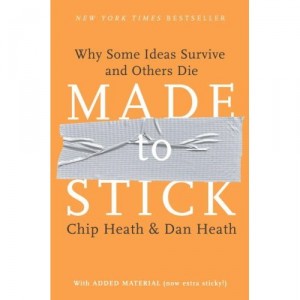 As communicators, we really only have one goal: make our messages stick. And no book better teaches the key components of a sticky message then Made to Stick by Chip and Dan Heath.
As communicators, we really only have one goal: make our messages stick. And no book better teaches the key components of a sticky message then Made to Stick by Chip and Dan Heath.
Why do some messages stick and others die? That’s a question that has been plaguing PR and marketing professionals since the dawn of both professions. It’s not uncommon to spend hours or days or even months crafting the perfect messaging (in you or your organization’s opinion of course) just to have it fall on deaf ears.
So how do we make messages stick? The authors say that sticky messages follow the six SUCCESs principles: Simple, Unexpected, Concrete, Credible, Emotional and Stories. A message doesn’t need to incorporate each principle to be sticky, however the authors say the more the better.
Simple
Simplicity is about prioritizing, finding the core of your message. No need to beat around the bush or clutter up a good message with meaningless buzzwords and gobbledygook. Keep the message compact, simple and to-the-point. Remember, a person’s attention span is fleeting, so don’t distract with unnecessary words and information.
Unexpected
Grab and hold attention. Have you ever been caught off guard by a message? We all have and those are the messages we remember and pass on. Pique people’s curiosity, and by doing so, your message will more likely stick.
Concrete
Concrete messages make people understand and remember. When something doesn’t add up, that’s when doubt and confusion sets in. Connect the dots for your audience by providing a solid example or relatable context.
Credible
Make your message believable. The credibility of the person and/or organization delivering the message is very important. No one will believe a message if they feel a person is not qualified to deliver it. In cases where the deliverer isn’t believable of their own, then the credibility of the facts and details of the message can help you overcome doubt.
Emotional
People care about people and even more about their own self interests. Tell your audience why it matters to them. By connecting with them on an emotional level, they are more likely to be moved to action. If they don’t care, they won’t listen.
Stories
Tell people how to act through stories. Stories simulate real life situations and provide important clues on how someone is expected to act. By telling a story with your message, you are providing a blueprint and context for action.
Now, whenever I write news releases, website copy, quotes, talking points, marketing collateral, etc., I go through the SUCCESs checklist. It may sound involved and time consuming but it’s not. Why bother spending time crafting a message that won’t stick.
There are many great examples of sticky and not so sticky messages in the book. Next week I will highlight some of the great ones and share a few I’ve found on my own.
What messages have stuck with you? Share with us by commenting below!

